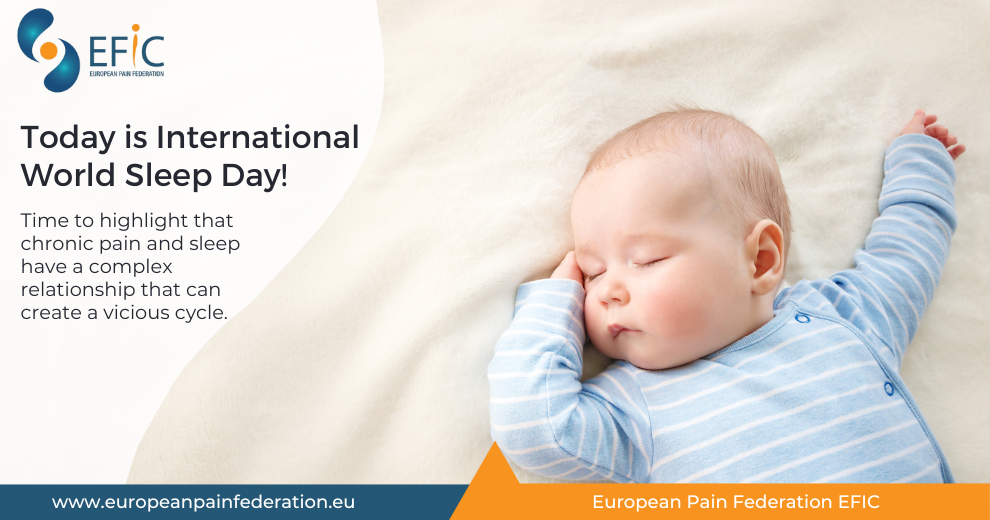World Sleep Day is an annual event organized by the World Sleep Society. It encourages: 1. An understanding and awareness of the importance of sleep in overall health, 2. the recognition of and current research on the burden of sleep disorders and sleep disruption, and 3. efforts for the prevention and management of sleep disorders and/or sleep disruptions. The theme for this World Sleep Day is Sleep is Essential for Health. Just like eating well and exercising, sleep is a behavior that is foundational to one’s physical, mental, and social well-being. However, sleep is not yet commonly considered an essential behavior for good health.
Chronic pain and sleep have a complex relationship that can create a vicious cycle. The relationship seems to work in two ways – poor sleep can be associated with the development or worsening of pain, or having pain can be associated with developing poor sleep.
Chronic pain can make it difficult to fall asleep, stay asleep, or achieve restorative sleep, and the resulting lack of quality sleep can exacerbate pain levels and perpetuate the cycle. One of the primary reasons that chronic pain can interfere with sleep is because of the discomfort it causes. Pain can make it difficult to find a comfortable sleeping position or even make it impossible to lie down altogether. This can lead to a decrease in sleep quality and duration. In addition, pain can disrupt the normal sleep cycle by causing frequent awakenings, which can reduce the amount of time spent in deep, restorative sleep.
The impact of chronic pain on sleep is not limited to physical discomfort. Pain can also cause emotional distress, which can interfere with sleep. Chronic pain sufferers may experience anxiety, depression, and feelings of hopelessness or helplessness. These emotions can lead to racing thoughts, making it difficult to fall asleep or stay asleep. They can also create a sense of fatigue, which can cause an individual to feel sleepy during the day, further disrupting the sleep-wake cycle. The impact of poor sleep on chronic pain can also be significant. Sleep deprivation can increase sensitivity to pain, making it more difficult to manage chronic pain. Lack of sleep can also interfere with the body’s natural healing processes, making it more challenging for the body to recover from injuries or inflammation that may be contributing to pain. Additionally, poor sleep can contribute to cognitive dysfunction, which can make it difficult to focus and manage pain effectively.
To break the cycle of chronic pain and poor sleep, it is essential to address both issues. Pain management techniques such as medication, physical therapy, and cognitive-behavioral therapy can be effective in reducing pain levels. Additionally, there is moderate evidence that exercise training and relaxation in the form of breathing or cognitive behavioural therapy can help improve sleep in people with pain. The European Pain Federation’s ‘On The Move’ campaign has extensive resources to help people participate in more exercise/physical activity.
Please see recent articles in the European Journal of Pain on this below:
- Investigation of Pain Sensitivity Following 3 Nights of Disrupted Sleep in Healthy Individuals
- Enhanced pain sensitivity in obese patients with obstructive sleep apnoea syndrome is partially reverted by treatment: An exploratory study
- Nature and nurture. Genetic and environmental factors on the relationship between back pain and sleep quality
- Preoperative sleep quality and adverse pain outcomes after total hip arthroplasty
- Sleep problems and psychological symptoms as predictors of musculoskeletal conditions in children and adolescents
- Sleep restriction does not potentiate nocebo-induced changes in pain and cortical potentials
- The association between sleep quality, low back pain and disability: A prospective study in routine practice
- Conditioned pain modulation is not decreased after partial sleep restriction
- Effect of sleep deprivation on the electrophysiological signature of habituation to noxious laser stimuli
- Sleep as a predictive factor for the onset and resolution of multi-site pain: A 5-year prospective study
- Development and pharmacological characterization of a model of sleep disruption-induced hypersensitivity in the rat
- Pain threshold and sleep quality in women with endometriosis
- Differences in suprathreshold heat pain responses and self-reported sleep quality between patients with temporomandibular joint disorder and healthy controls
- Effects of pain management on sleep in preterm infants
- Sleep continuity and architecture: Associations with pain-inhibitory processes in patients with temporomandibular joint disorder
- Effect of acute gouty arthritis on sleep patterns: A preclinical study
- Impaired health status, sleep disorders, and pain in the craniomandibular and cervical spinal regions
- The impact of spinal cord stimulation on physical function and sleep quality in individuals with failed back surgery syndrome: A systematic review
To find out more about World Sleep Day, visit https://worldsleepday.org/.
